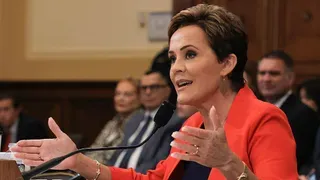September 16, 2011
Utahns Condemn Spate of Gay Attacks
Shaun Knittel READ TIME: 4 MIN.
A series of attacks against gay Utahns has left local activists on edge.
The most recent incident took place early on Sept. 8 when Cameron Nelson was attacked in American Fork.
Nelson, 32, was working at a hair salon when he said up to three people began beating him up and yelling anti-gay slurs at him. He told police he was taking out the garbage at the salon around 12:45 a.m. when the assault began. Nelson suffered a broken nose and was treated for minor injuries.
Nelson believes he was assaulted because of his sexual orientation and told police that he did not know his attackers.
Sargent Gregg Ludlow of the American Fork Police Department described the anti-gay remarks made towards Nelson "disgusting" and called the actions of the attackers "quite repugnant," but the Sept. 8 incident is the latest in a series of attacks to have taken place in the area.
Dane Hall, 20, was brutally attacked and severely beaten outside Club Sound in Salt Lake City on Aug. 26 after leaving the dance club on "gay night." Hall lost six teeth, suffered a broken jaw in multiple place when his attackers "curbed" or "curb stomped" him. In another incident, a group of men broke into a gay man's Salt Lake City apartment and beat up his boyfriend.
Earlier this year, several assailants attacked Jordan Corona, 21, from behind as he left Club Sound. He was later treated for a concussion.
It would seem that the citizens of Utah-Salt Lake City in particular-have had enough.
More than 200 people attended a vigil on Sept. 9 to speak out against the assaults in Salt Lake City and American Fork. City of Hope Salt Lake, a non-denominational church, organized the event that drew members of diverse faiths from American Humanists to Mormons to call for greater acceptance of LGBT people.
Nelson's sister, Marnie Nelson Bales, said he has been a "ray of sunshine" from the day he was born. She always knew he was different and said she was not surprised when he came out as gay at age 16.
"I'm LDS. My family is LDS. And you know, it doesn't matter. He's my brother. We love him," said Bales as the Associated Press reported. "It's intolerable to treat someone as less than precious and valuable."
Hall, who had his jaw broken in three places and six teeth knocked out when he was attacked at Club South late last month, thanked the crowd for their support as he spoke through his wired-shut jaw.
"Thank you for coming out and supporting us," said Hall. "I don't know how to express myself, but just know that I am very thankful." He added his medical expenses could surpass $40,000, but he has no health insurance.
Salt Lake City Police Chief Chris Burbank shared a personal story about his cousin, a gay man who was a victim of domestic violence on multiple occasions but wouldn't report the violence for fear of others finding out about his sexual orientation. He urged the crowd to contact the police when anti-gay violence takes place-and officers handed out cards that detail how the public can submit confidential tips.
"We have people in our community who still cannot come forward because of the stigma that may be attached to them," said Burbank, as the Salt Lake Tribune, Deseret News and other local media outlets reported. "Any crime represents a failure of our society, especially a crime like this."
Brandie Balken, executive director of Equality Utah, echoed Burbank's call. "If you see something, say something," she told EDGE. "What we can do, as a great community, is report a crime whenever we witness them. It is our job to come forward so we can protect each other."
Balken said one would be pressed to find anyone who did not condemn the crimes.
"We've seen an amazing outpouring of support from the LGBT and allied communities," she said. "These kinds of targeted acts of violence don't just occur to LGBT persons, lots of other groups are targeted for aggression as well."
She said Utah and Salt Lake City "finds this behavior intolerable," but officials are unable to label them as hate crimes because state law does not specifically define them.
"We have a hate crimes statute but it is not enumerated," said Balken. "You can't prosecute anyone for a hate crime, but they can receive 'enhance punishment' during sentencing if a judge finds that the assault was done with clear intent to intimidate or strike fear through a certain population."
In other words, a judge or the State Board of Pardons and Parole can consider community unrest or reasonable fear for people's physical safety - and their free exercise of constitutional rights �- when deciding on enhanced punishment. The Criminal Penalty Amendments bill was enacted in 2006 after a 15-year fight to lobby the Legislature to pass any measure that would address crimes intended to terrorize Utahans.
The majority of states have adopted fairly robust hate crime laws, but Utah is among 14 states with statutes that do not include sexual orientation or gender identity and expression.
Balken stressed, however, that the majority of Utahns do not condone the recent string of violence-which has reopened the doors for a discussion about the current hate crimes statute and how it "does not do enough."
"Equality Utah and the LGBT community are deeply concerned about these assaults," she said. "We are working with the police department to ensure swift investigation and appropriate prosecution. Targeted violence based on real or perceived characteristics is unacceptable and a vast majority of Utahns support safe and inclusive communities for all our residents."
Shaun Knittel is an openly gay journalist and public affairs specialist living in Seattle. His work as a photographer, columnist, and reporter has appeared in newspapers and magazines throughout the Pacific Northwest. In addition to writing for EDGE, Knittel is the current Associate Editor for Seattle Gay News.



